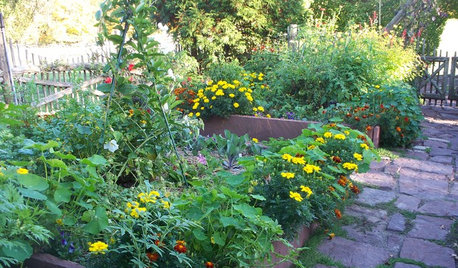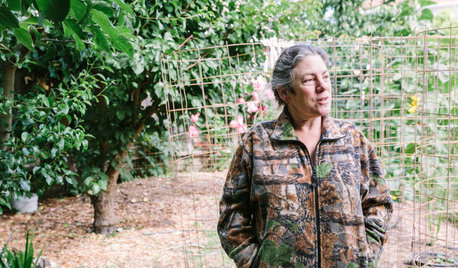Organic gardeners--how do you get rid of pests??
keeperofthememories
16 years ago
Related Stories

EDIBLE GARDENSNatural Ways to Get Rid of Weeds in Your Garden
Use these techniques to help prevent the spread of weeds and to learn about your soil
Full Story
GARDENING AND LANDSCAPING4 Good Ways to Get Rid of Mosquitos in Your Yard
Stay safe from West Nile virus and put an end to irksome itches with these tools and methods for a porch, patio or yard
Full Story
MOST POPULARHow to Get Rid of Those Pesky Summer Fruit Flies
Learn what fruit flies are, how to prevent them and how to get rid of them in your home
Full Story
DECLUTTERINGDownsizing Help: How to Get Rid of Your Extra Stuff
Sell, consign, donate? We walk you through the options so you can sail through scaling down
Full Story
DECORATING GUIDESLose It: How to Get Rid of a Mattress
Updating your bedroom? Here's how to donate, reuse or recycle that mattress — and keep it out of the landfill
Full Story
DECORATING GUIDESLose It: 4 Ways to Get Rid of Your Old Carpet
Try one of these earth-friendly tips before stuffing your dingy carpet or rug in the trash
Full Story
GARDENING GUIDESOrganic Matters: Thwart Insect Pests With Trap Crops
Add a few sacrificial plants to your garden to lure insects away from the harvest
Full Story
HOUSEKEEPING7-Day Plan: Get a Spotless, Beautifully Organized Garage
Stop fearing that dirty dumping ground and start using it as the streamlined garage you’ve been wanting
Full Story
ORGANIZING7-Day Plan: Get a Spotless, Beautifully Organized Kitchen
Our weeklong plan will help you get your kitchen spick-and-span from top to bottom
Full Story
FARM YOUR YARDTo Get the Food They Believe In, These Urbanites Grow Their Own
Home gardeners farming on their city lots find that local, organic food isn’t the only reward
Full Story


justaguy2
albertar
Related Discussions
organic gardening/getting rid of grasshoppers. Please help
Q
How do I get rid of this pest on my Pendula Bruns?
Q
Grubs in the garden! How to get rid of them naturally/cheaply?
Q
Organic way to get rid of aphids?
Q
greatlakesmower
keeperofthememoriesOriginal Author
iacche
justaguy2
keeperofthememoriesOriginal Author
lelia
julieann_grow
gratefuled
Karen Pease
keeperofthememoriesOriginal Author
gamebird
lilacs_of_may
oldroser
keeperofthememoriesOriginal Author
koreyk
flora_uk
hottomato
laceyvail 6A, WV
keeperofthememoriesOriginal Author
scottamuss
vgkg Z-7 Va
Violet_Z6
geedee-10se